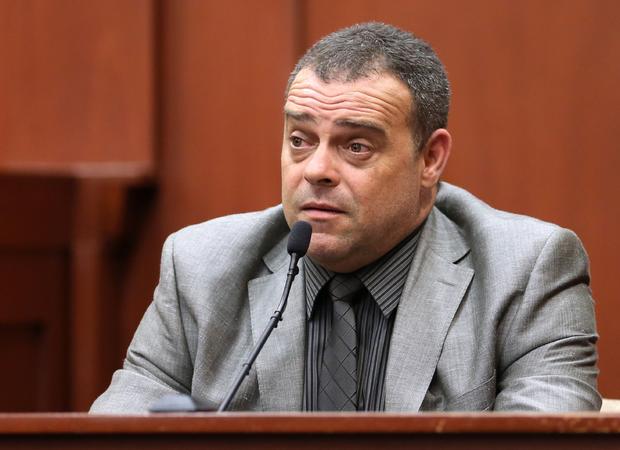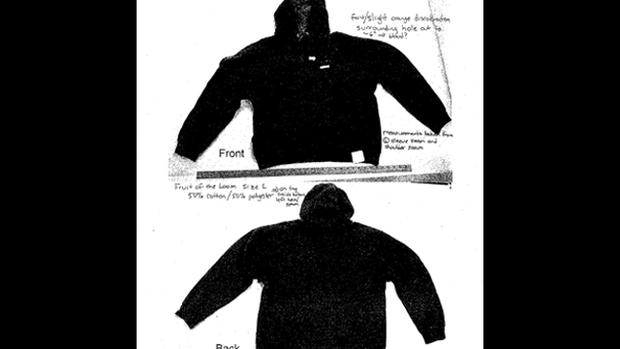George Zimmerman trial: Chris Serino, lead detective in case of Trayvon Martin killing, takes stand again Tuesday
(CBS/AP) -- Chris Serino, the lead investigator on the Trayvon Martin shooting case, continued his testimony Tuesday morning.
While Serino told defense attorneys there were no major inconsistencies with the account of events George Zimmerman gave police, prosecutors aimed to highlight police questioning of Zimmerman's story and what prosecutors called "ill will" in the profanity-laced language Zimmerman used in a non-emergency call the night of the fatal altercation.
PICTURES: George Zimmerman on trial in death of Fla. teen
PICTURES: George Zimmerman crime scene photos
READ: Trayvon Martin Shooting: A timeline of events
Zimmerman is standing trial in the shooting death of the Florida teen. He claims he killed Martin in self-defense.
Playing portions of the Feb. 29, 2012 interview in which police played back a portion of Zimmerman's non-emergency call, prosecutor Bernie de la Rionda asked whether referring to someone as "---ing punks" demonstrates "ill will" or spite," elements of the second-degree murder charge the state is seeking to prove. Zimmerman used the phrases "f---ing punks" and "these (expletives) always get away" on the call with dispatchers.
Serino said it did.
Zimmerman told police in the Feb. 29 interview that he was referring to people that "victimize the neighborhood." Several recent burglaries in the area had prompted Zimmerman to coordinate a neighborhood watch program in his gated community, the Retreat at Twin Lakes.
O'Mara asked Serino about the recent burglaries, asking about a man who had been arrested for burglarizing homes near Zimmerman's neighborhood. Responding to O'Mara's question, Serino said he wasn't concerned that Zimmerman was worried about crime in the neighborhood.
O'Mara asked whether the term "these assholes always get away" demonstrated ill will or spite.
"If I may, not towards and individual - it seemed like more of a generalization," Serino said.
Both prosecutors and defense attorneys asked Serino about when and whether George Zimmerman was following Trayvon Martin the night of the altercation. De la Rionda replayed a portion of the Feb. 29 interview tape in court, in which Zimmerman says, "They told me not to follow him. I wasn't following him, I was just going in the same direction."
"That's following," Serino said on the tape.
O'Mara asked whether Serino had any evidence that Zimmerman continued to follow Trayvon Martin after a non-emergency dispatcher told him not to.
"I would answer I have information, yes," Serino said. "Just based on where we located Trayvon and the fact that the altercation happened after the confrontation. That's my interpretation. There was some following."
Responding to a question from defense attorney Mark O'Mara about Zimmerman's Feb. 29, 2012 interview with police, Serino said he found no inconsistencies "I could challenge him with."
VIDEO: Zimmerman trial: Prosecutor opens with profanity
Playing the Feb. 29 interview tape in court, de la Rionda highlighted portions of the interview during which investigators questioned Zimmerman's story, including his claim that he wasn't following Martin. De la Rionda also pointed out Zimmerman claimed that after he shot Martin, he spread out the teen's arms. But a photo taken immediately after the shooting shows Martin's arms under his body.
De la Rionda asked whether Zimmerman may have been profiling Martin as someone who was a criminal.
"If I were to believe someone was committing a crime, would that not be profiling that person?" De la Rionda asked.
"It could be construed as such, yes," Serino answered.
Responding to a question from de la Rionda, Serino said that there was no evidence that Martin was committing a crime that evening. O'Mara asked him whether he knew that for sure, referencing a burglary tool that was found in bushes near the crime scene about five or six days following the shooting.
Serino said the tool was "a device used to go ahead and jimmy locks, on vehicles primarily."
"It's not particularly tied to this case, but it was there, wasn't it?" O'Mara asked.
"Yes it was," Serino replied.
Serino finished his testimony Tuesday morning but was subject to being re-called.


